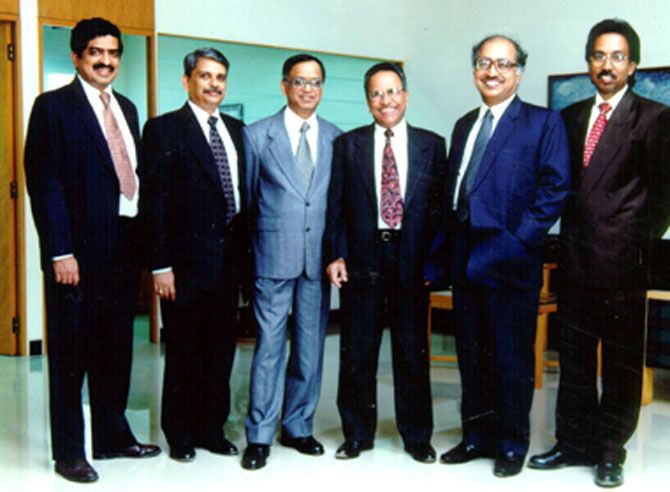 | « Back to article | Print this article |
The time is ripe to accede to the founders' plea to declassify them as promoters.

Image: A file photograph of Infosys founders (Left to right): Nandan Nilekani, S Gopalakrishnan, N R Narayana Murthy, K Dinesh, N S Raghavan and S D Shibulal. Photograph: Kind courtesy, Infosys Technologies
The appointment of Salil Parekh as Infosys’s second non-founder chief executive, four months after the acrimonious exit of the company’s first such CEO, Vishal Sikka, presents India’s second largest information technology services provider with an opportunity to heed the request of its co-founders made three years ago of being declassified as promoters.
This will provide the Infosys board the freedom to run the company without the added pressure of coping with the anxieties of its founders, who have held a nebulous status within the company ever since mentor N R Narayana Murthy appointed a professional successor in 2014 and stepped aside after his second stint at the helm of the company.
As promoters, Infosys’s co-founders retain all the legal liabilities, including those of “insiders”, which come attached with that status under company and stock exchange laws.
But after 2014, when they had divested themselves of the responsibility of running Infosys, the continuing status of Infosys founders as promoters has meant that they bear all the burdens of being legally responsible for decisions the management makes.
This was the proximate reason for the founders’ request to the company’s management for declassifying them as promoters.
The promoter group, including family, collectively owns 12.76 per cent of Infosys.
The board, however, had requested the founders to stay on as promoters, principally as a confidence-building exercise with clients and shareholders at a critical juncture for Infosys.
Mindful, perhaps, of the excoriating criticism that accompanied his return as executive chairman in 2014, replacing the last co-founder, D Shibulal, to shore up the company’s faltering performance, Mr Murthy declined a board position once Mr Sikka took charge.
Mr Murthy owns less than 1 per cent of Infosys through direct holdings but his family holds 3.44 per cent, making it the company’s largest single shareholder.
Seen against this background, Mr Murthy was well within his rights to raise concerns in 2016 about irregularities in the $200-million purchase of the Israeli infotech company Panaya -- the controversy that led to Mr Sikka’s exit.
To be sure, his publicly expressed reservations, following a whistleblower’s allegations, did Infosys little good, a point that should have occurred to him in his avatar as a concerned promoter.
Still, his revelations about the value of the deal and questionable departures by senior executives soon after the acquisition forced the Infosys board to launch an independent inquiry, a good move that was vitiated by its decision to withhold the report from the public, including Mr Murthy.
Nandan Nilekani’s return in a firefighting role suggested Infosys and its promoters were well-nigh inseparable, raising serious doubts about the sustainability of the company’s governance model.
But Mr Nilekani has manifestly demonstrated that he is uninterested in continuing his managerial role in the company.
It is worth noting that it was only after the Infosys founders’ request for declassification that the Securities and Exchange Board of India moved to reconsider the regulatory framework for promoters.
Its Listing Obligations and Disclosure Requirements Regulations now allow promoters to be declassified under a stringent set of norms -- non-involvement in day-to-day management being one of them.
This provides the Infosys board with a modus operandi to accede to the request of its founders to convert themselves into public investors.